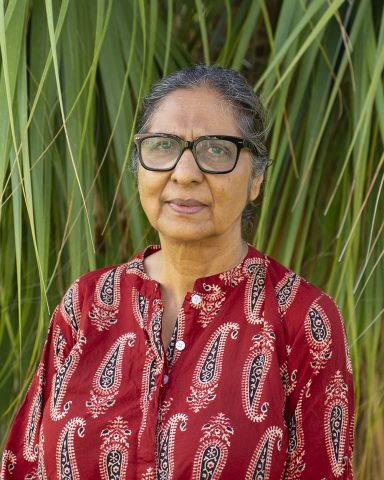TAMARA ALBERTINI
Professor & Department Chair
Sakamaki Hall D-303/D-301A
t: 808.956.6030
e: tamaraa@hawaii.edu
Dr.phil. Ludwig-Maximilians-Universität, Munich (Germany)
Lic.phil. University of Basel (Switzerland)
Renaissance and Early Modern Philosophy, Islamic Philosophy, Contemporary Arab Philosophy, Feminist Issues in Philosophy

Professor Albertini’s research in Renaissance philosophy focuses on Nicholas of Cusa (mathematics, cosmology), Marsilio Ficino (metaphysics, aesthetics) and Charles de Bovelles (sapientia, ars oppositorum, analogia) in whose works she detects an alternative type of rationality: inclusive and reconciliatory. She is also interested in the innovative use of mathematical figures and other visual means in Renaissance works as “philosophical language.” Her most recent paper is entitled “‘Methodic Foundering’ or ‘Methodic Overcoming of Rationality?’ Metaphysics of Liberation in Karl Jaspers and Nicholas of Cusa”(2021). She is also the co-founder and President of The International Charles de Bovelles Society.
Within Islamic philosophy, Professor Tamara Albertini’s publications aim at reintroducing the vigor and vision of Muslim intellectual contributions from the classical period. More recently, she guest-edited Politics, Nature, and Society: The Actuality of North African Philosopher Ibn Khaldūn. Special issue of Philosophy East and West 69, 3 (2019). Her seminal article “The Seductiveness of Certainty. Fundamentalists’ Destruction of Islam’s Intellectual Legacy,” Philosophy East and West (2003) has been quoted in multiple annual Congress reports. Currently, she is completing her book on Rābi‘a al-‘Adawiyya, the famous Sufi from Basra.
Professor Albertini has been awarded many national and international fellowships and grants, including a NEH Travel Grant for Iran and Central Asia. She was honored with the Excellence in Teaching Award (2016), a Fulbright Scholar Award (2018/19, Bulgaria), and the Distinguished Scholar Award from Cairo University (2019).
VRINDA DALMIYA
Professor
Sakamaki Hall B-303
t: 808.956.5981
e: vrinda@hawaii.edu
Ph.D., Brown University
Epistemology, Feminist Philosophy, Environmental Philosophy

Vrinda Dalmiya received a M.Phil from Jadavpur University, India and a Ph.D. from Brown University. She has been a Fellow at the Indian Institute of Advanced Studies in Shimla, India, where she worked on a comparative project involving feminist care ethics, virtue epistemology and the Sanskrit epic, the Mahabharata. Dr. Dalmiya is mainly interested in analytic feminism. Her areas of research include care ethics, epistemology, gender and environmental philosophy, gender and disability and comparative philosophy. She has published in numerous anthologies and journals like Hypatia, Environmental Ethics, Journal of Social Philosophy and Sophia.
MASATO ISHIDA
Professor
Sakamaki Hall B-305
t: 808.956.8250
e: masatoi@hawaii.edu
Ph.D., The Pennsylvania State University
Classical American Philosophy, Japanese Philosophy, Process Philosophy, History and Philosophy of Mathematical Logic

Masato Ishida received his academic training in Japan, Canada, and the United States. He joined the department in 2009 after completing his PhD in philosophy at the Pennsylvania State University. He specializes in classical American philosophy, history and philosophy of logic, and traditional Japanese philosophy. Recent works include “The Sense of Symmetry: Comparative Reflections on Whitehead, Nishida, and Dōgen” (Process Studies, Vol. 43, No. 1, pp. 4-34, 2014) ; “The Metaphysics of Pluralistic Manifestations in James and East Asian Buddhism” (William James Studies, Vol. 10, pp. 1-7, 2014) ; “A Peircean Reply to Quine’s Two Problems” (Transactions of the Charles S. Peirce Society, Vol. 49, No. 3, pp. 322-347, 2013). He is a member of the Center for Japanese Studies and the Center for Okinawan Studies at the University of Hawai‘i at Mānoa. He was honored with the Excellence in Teaching Award (2021).
THOMAS E. JACKSON (retired)
Specialist & Director of UHM Uehiro Academy
Sakamaki Hall C-307
t: 808.956.7287
e: tjackson@hawaii.edu
Ph.D., University of Hawai‘i at Mānoa
Executive Director, UHM Uehiro Academy for Philosophy and Ethics in Education
Philosophy for Children

Thomas E. Jackson earned his doctorate in Comparative Philosophy from the University of Hawai‘i in 1979. In 1980 he became a co-founder of the Hawai‘i International Film Festival. In 1984 he trained in “Philosophy for Children” (P4C) at Montclair State University in New Jersey with other scholars from around the world. There he learned from P4C’s creator, Matthew Lipman, an inspiring approach to working with children, a provocative new way of thinking about philosophy, and an exciting development in education. Since 1984 he has been passionately committed to the development of P4C in Hawai‘i and around the world. He is currently serving as Executive Director of the newly established UHM Uehiro Academy for Philosophy and Ethics in Education. Dr. Jackson received a Chancellor’s Citation for Meritorious Teaching (2012) and the Robert W. Clopton Award for Distinguished Community Service (2021). His ongoing research interests focus on demonstrating the impact of doing philosophy with children in grades K-12. His publications include “Home Grown”, “Educational Perspectives: Journal of the College of Education/University of Hawai`i at Mānoa”, “Philosophical Rules of Engagement”, Philosophy in Schools: An Introduction for Philosophers and Teachers, “Philosophy for Children Hawaiian Style—“On Not Being in a Rush…” “Thinking: The Journal of Philosophy for Children”, “The Art and Craft of ‘Gently Socratic’ Inquiry”, Developing Minds: A Resource for Teaching Thinking, (3rd edition), Freiheit in interkultureller Perspective, by Thomas E. Jackson and Ramakrishna Puligandla.
BENJAMIN LUKEY
Specialist & Associate Director, UHM Uehiro Academy
Sakamaki Hall C-307
t: 808.956.6699
e: lukey@hawaii.edu
Ph.D., University of Hawai‘i at Mānoa
Associate Director, UHM Uehiro Academy for Philosophy and Ethics in EducationPhilosophy for Children, Philosophy of Disability, Philosophy of Education

Benjamin Lukey received his doctorate in comparative philosophy from the University of Hawai‘i at Mānoa in 2009. His interests in philosophy of disability, comparative philosophy, and philosophy for children (p4c) have developed from his broader goal of including more voices in philosophical discourse. Since 2007, he has been part of the p4c Hawai‘i initiative at the University of Hawai‘i at Mānoa, piloting and developing a Philosopher in Residence project at Hawai‘i public schools. Dr. Lukey continues to support p4c Hawai‘i teachers and students at several schools across Oahu and at the University of Hawai‘i at Mānoa, where he serves as the Associate Director for the UHM Uehiro Academy for Philosophy and Ethics in Education (p4chawaii.org).
KEYA MAITRA
Lenney Distinguished Professor
Sakamaki Hall C-303
t: 808.956.0753
e: keyam@hawaii.edu
Ph.D., University of Hyderabad, India
Ph.D., University of Connecticut
Indian Philosophy, Philosophy of the Bhagavad Gītā, Cross-Cultural Philosophy, Feminist
Philosophy of Mind, Transnational Feminism, and the Philosophy of Wellbeing

Keya Maitra’s intellectual journey bridges continents and traditions. She has been a professor at the University of North Carolina Asheville, where she also served as the director of the Humanities Program and Thomas Howerton Distinguished Professor of Humanities (2018-22). Her research and teaching facilitate critical conversations across cultural and disciplinary
boundaries.
Professor Maitra’s work is both globally informed and socially resonant. Her scholarship has appeared in the Journal of the American Philosophical Association, Hypatia, Asian Philosophy, Philosophy in the Contemporary World, Southern Journal of Philosophy, Philosophy East and West, and International Journal of Philosophical Studies, and numerous anthologies. Her books include Feminist Philosophy of Mind (co-edited with Jennifer McWeeny; Oxford University Press 2022), Philosophy of the Bhagavad Gita: A Contemporary Introduction (Bloomsbury 2018), The Ethics of Governance: Moral Limits of Policy Decisions (co-authored with Shashi Motilal and Prakriti Prajapati; Springer 2021) and On Putnam (Wadsworth 2003).
She is the recipient of numerous honors, including the UNC Board of Governors Award for Excellence in Teaching (2023), the Champion for Students Award (2018), and a Fulbright-Nehru Senior Research Award (2015). She has delivered numerous keynote addresses and was honored to serve as the Commencement Speaker at UNCA’s December 2023 Graduation.
STEVE ODIN
Professor
Sakamaki Hall B-307
t: 808.956.8172
e: steveo@hawaii.edu
Ph.D., State University of New York at Stony Brook
Japanese Philosophy, Comparative Philosophy, American Philosophy, Metaphysics, Phenomenology, Aesthetics

Steve Odin joined the department in 1982 after completing his PhD degree in philosophy from State University of New York at Stony Brook. He has taught as a visiting professor at Boston University (1989), Tohoko University (1994-95) and the University of Tokyo (2003-04). His research and teaching areas include Japanese philosophy, East-West comparative philosophy, American philosophy, Whitehead’s process metaphysics, phenomenology, existentialism, environmental ethics, and aesthetics. Among his publications are Process Metaphysics and Hua-Yen Buddhism (1982), The Social Self in Zen and American Pragmatism (1994), Artistic Detachment in Japan and the West: Psychic Distance in Comparative Aesthetics (2001), and Tragic Beauty in Whitehead and Japanese Aesthetics (2016). Among his awards are one-year grants for teaching and research in Japan, including two Fulbright Awards (1994-95 and 2003-04), Japan Foundation Award (2001-02) and National Endowment for the Humanities (1987-88), as well as the Presidential Award for Excellence in Teaching at the University of Hawaii (1986), the Association of Asian Studies /Northeast Council for Asian Studies Award (1998), the Templeton Foundation Award (2000) and the Niwano Peace Foundation Award (2001). He is a member of the UH Center for Japanese Studies.
FRANKLIN PERKINS
Professor & Editor of Philosophy East and West
Graduate Chair
Sakamaki Hall B-302B
e: perkinsf@hawaii.edu
Ph.D. Pennsylvania State University
Classical Chinese Philosophy, Early Modern European Philosophy, Comparative Philosophy

Franklin Perkins received his Ph.D. from Pennsylvania State University and has been a professor at Nanyang Technological University (Singapore) and at DePaul University (Chicago), where he was also director of the Chinese Studies Program. His main teaching and research interests are in classical Chinese philosophy, early modern European philosophy, and in the challenges of doing philosophy in a comparative or intercultural context. In the past few years, he has been focused particularly on the philosophical significance of recently excavated Chinese texts that were buried around 300 BCE. He is the author of Heaven and Earth are not Humane: The Problem of Evil in Classical Chinese Philosophy (Indiana, 2014), Leibniz: A Guide for the Perplexed (Bloomsbury, 2007), and Leibniz and China: A Commerce of Light (Cambridge, 2004), and he was co-editor (with Chenyang Li) of Chinese Metaphysics and Its Problems (Cambridge, 2015). His books have been translated into Portuguese, Chinese, and Japanese.
SEAN M. SMITH
Associate Professor
Sakamaki Hall B-313
t: 808.956.8954
e: sean.smith@hawaii.edu
Personal Website
YouTube Channel
Ph.D., University of Toronto
Indian Buddhism, Philosophy of Mind, Phenomenology, Cognitive Science

Prof. Smith earned both a B.A. (hons) and Ph.D. from the Department of Philosophy at the University of Toronto. His research is focused on the intersection of Indian Buddhist philosophy (with a particular emphasis on the Pāli tradition) and contemporary philosophy of mind, cognitive science, and moral psychology. Specifically, his work addresses the connection between embodied affect, consciousness, and attention. In particular, he is trying to understand how affective biases shape perceptual salience and what kind of normative obligations we might be under in light of that shaping process. Other related interests include pain and suffering, animal consciousness, and the nature of the self. His research has been published in the Journal of Indian Philosophy, Sophia, Review of Philosophy and Psychology, and Philosopher’s Imprint. Professor Smith was the recipient of the 2022 College of Arts, Languages & Letters Excellence in Teaching Award at UH Mānoa.
JOSEPH TANKE
Professor
(On sabbatical during 2024/25)
Sakamaki Hall D-307
t: 808.956.7001
e: tanke@hawaii.edu
Ph.D., Boston College
Continental Philosophy, Aesthetics, Historical Ontology, Social and Political Philosophy

Joseph Tanke earned his Ph.D. at Boston College. He has lectured and published extensively on issues and figures in Continental philosophy, aesthetics, and the history of philosophy. His major publications include Foucault’s Philosophy of Art: A Genealogy of Modernity (Continuum, 2009) and Jacques Rancière: An Introduction—Philosophy, Politics, and Aesthetics (Continuum, 2011). Professor Tanke recently completed (with Colin McQuillan) The Bloomsbury Anthology of Aesthetics (Bloomsbury, 2012), a new textbook for use in courses dedicated to aesthetics, the philosophy of art, and literary theory. Additionally, Professor Tanke is interested in comparative aesthetics, social and political philosophy, and the historical ontology of pain within Western thought and medicine.
GEORGE TSAI
Professor
Sakamaki Hall B-306
t: 808.956.8734
e: gtsai@hawaii.edu
Ph.D., University of California, Berkeley
B.A., summa cum laude, Amherst College
Ethics, Political Philosophy, Moral Psychology, Chinese Philosophy

George Tsai joined the Department in 2012, and is an affiliated member of the Center for Chinese Studies. He has been a Postdoctoral Research Fellow in the School of Philosophy at the Australian National University and a Visiting Fellow at the Center for Advanced Studies of the Ludwig-Maximilians-Universität München. His research interests are in moral and political philosophy, broadly understood to encompass contemporary and cross-cultural perspectives on these subjects. Some topics of his writings include rational persuasion, blame, gratitude, faith, friendship, exploitation, paternalism, and the state’s taxation and expressive powers. He has also written on issues in moral psychology and political philosophy in Early Chinese Philosophy. His publications have appeared in venues including Philosophy and Public Affairs, Journal of Political Philosophy, Oxford Studies in Agency and Responsibility, Pacific Philosophical Quarterly, Journal of Applied Philosophy, Social Theory and Practice, Philosophy East and West, and Journal of Chinese Philosophy.